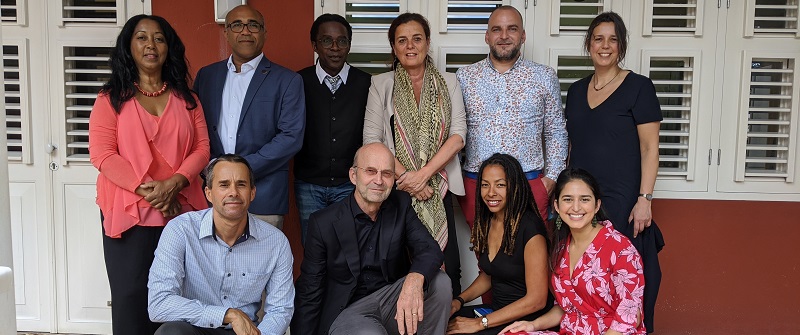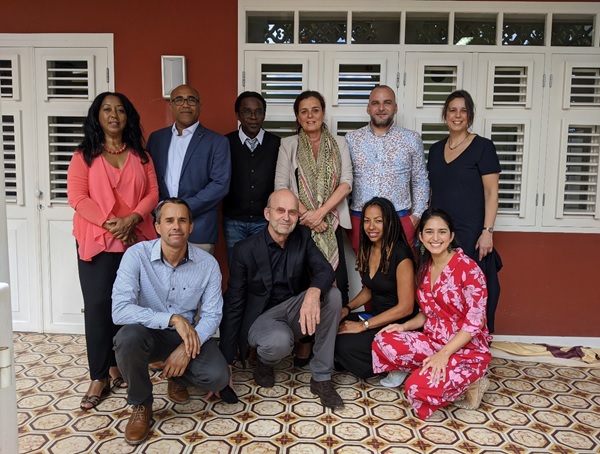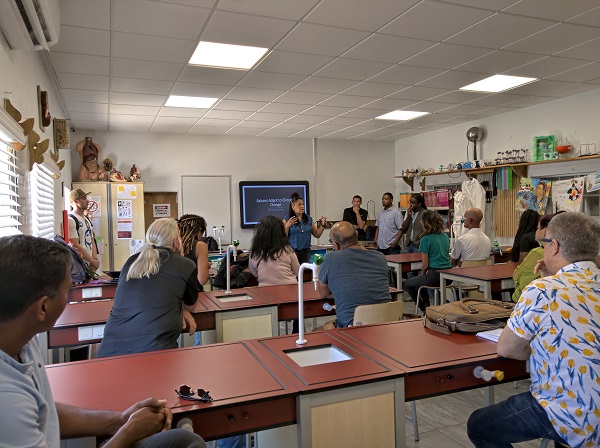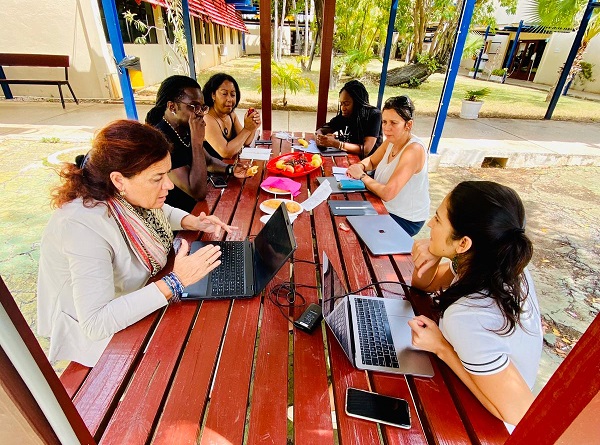
25 Feb ‘Island(er)s at the Helm’ awarded with funding from the NWO Caribbean Research programme
On January 7th Minister van Engelshoven of Education, Culture and Science of The Netherlands announced that the project Island(er)s at the Helm: Co-creating sustainable and inclusive solutions for social adaptation to climate challenges in the (Dutch) Caribbean is one of two projects awarded with funding from the NWO Caribbean Research programme.
The Island(er)s at the Helm project is chaired by Dr. Francio Guadeloupe (University of Amsterdam/KITLV), with co-applicants Prof. dr. Corinne L. Hofman (Leiden University/KITLV), Dr. Antonio Carmona Báez (University of St. Martin), and Prof. dr. ir. Filomeno A. (Boey) Marchena (University of Curaçao).

A large part of the Island(er)s at the Helm group at the National Archaeological Museum Aruba. Fltr top: Liliane de Geus (UNESCO workgroup Bonaire), Antonio Carmona Báez (USM), Francio Guadeloupe (UvA, KITLV), Corinne Hofman (LU, KITLV), Ergün Erkoçu (UoC), Ellen van Bueren (TU Delft). Fltr bottom: Harold Kelly (NAMA), Menno Hoogland (KITLV), Sharelly Emanuelson (Uniarte), Tibisay Sankatsing Nava (KITLV) (photo: Tibisay Sankatsing Nava).
Since the first occupation of the islands, hurricanes and the devastation of coastal areas have significant ecological and social implications for the (Dutch) Caribbean. These are deeply impacting the basic living conditions (water, food, shelter) and heritage of the island inhabitants. This requires immediate action! Island(er)s at the Helm brings together researchers and societal partners to combine technical, traditional, and contemporary knowledge practices to co-create sustainable and inclusive strategies for social adaptation to these climatic challenges. A trans-Atlantic academic platform will be developed fostering research-based education on climate challenges for the six islands. Moreover, a regional expertise center on climate challenges, where the Dutch Caribbean researchers can find employ, is one of the end objectives of this programme. This center will be jointly managed by the University of St. Martin, University of Curacao, University of Aruba (Dr. Eric Mijts of the SISSTEM project), and the Caribbean Netherlands Science Institute. These institutions have committed to working towards this integration by offering joint courses in cooperation with institutes in the region and the wider Kingdom of the Netherlands.
From 2 to 13 March 2020, a team of researchers and societal partners travelled to the six Dutch Caribbean islands to organize outreach seminars and bring together researchers and local stakeholders to discuss the initial ideas and set-up of the NWO programme Island(er)s at the Helm. The main objective of the seminars was to discuss the climate change challenges that face the Caribbean island(er)s; to define common goals of interest towards social adaptation to climate change; to broaden and consolidate the prospective network of partnerships; and to start off discussions to co-create questions and approaches to shape the full proposal. These conversations contributed to the final Island(er)s at the Helm programme.

One of many co-development meetings organized in March 2020, this one at St. John’s School in Saba. During these meetings, ideas were presented to, and discussed with, local stakeholders and community members in preparation of the full scientific proposal of Island(er)s at the Helm for NWO (photo: Menno Hoogland).
The emphasis within this NWO programme is on the structural strengthening of the knowledge system and the embedding of scientific research in the Caribbean part of the Kingdom of the Netherlands. NWO wants to achieve this goal by means of two large multidisciplinary research programs that are carried out and anchored in the region itself. The research programs focus on issues of great social and scientific importance to the Caribbean region and promote the transfer of knowledge through education and outreach. Never before has NWO funded programs of this size in the Caribbean part of the Kingdom.
“This project is about NWO truly investing in research that benefits our islands. Climate change is real. We know this from Irma and the rise of the frequency of hurricanes in our region. We know this from the heavy rainfall and droughts on the ABC islands. We know this from the rise in earthquakes and now a volcano waking up in the wider Caribbean. There is absolutely no time to waste on cooperating Kingdom-wide, even if some of us rightly attend to the colonial past. That righteous attention must not deter us from recognizing that by paying their taxes, the hardworking Caribbean diaspora in the Netherlands have partially contributed to the funding of this programme”, said Guadeloupe, who also recognized the hard work of those who inside NWO pushed for a fair distribution of funds among kingdom partners (stmaartenagriculture.com).
Corinne Hofman, co-applicant and professor of Caribbean Archaeology at Leiden University and senior researcher at the KITLV: “It is fantastic to be part of this transdisciplinary programme, which will study social adaptation to climate challenges from a long-term perspective, bridging the past and the present. Culture and climate adaptation are inextricably and indispensably connected to each other and we will focus on how heritage can contribute to resolve societally relevant questions, in this case how to approach and adapt to climate challenges, thereby strengthening cultural identity and a sense of belonging. I am particularly looking forward to the collaborations in the trans-Atlantic academic platform. This platform is one of many ways in which stakeholders (GOs, NGOs, local communities, and researchers) across the Kingdom will connect, undoubtedly resulting in successful and sustainable embedding and implementation of the project’s results in local and regional education.”

Part of the Island(er)s at the Helm team working on incorporating feedback and ideas from the co-development meetings organized in March 2020 into the full scientific proposal of the project for NWO. Here, the team was at the University of Curaçao (photo: Ergün Erkoçu).
President of the University of Sint Martin and co-applicant of the project Antonio Carmona Báez also made public his remarks: “This is the most significant thing that has ever happened to USM, we can now become a full-fledged developmental university sponsoring research-based teaching that is essential to the sustainable progress of our Caribbean people. Together with other institutions of higher education in our region and our brothers and sisters in the diaspora, we can move forward by putting knowledge at the service of our islands. By co-creating solutions with historians, artists, archaeologists, anthropologists, urban engineers, farmers and students we can start to build that sustainable future looking inside and around us. No longer will research agendas be dictated from abroad and from now on the results of research that is conducted in our region will serve the people of the six Caribbean islands. This is about emancipation and empowerment.”, Carmona said (stmaartenagriculture.com).
Prof. dr. ir. Filomeno (Boey) Marchena, co-applicant and Head of the UNESCO Chair on Sustainable Water Technology and Management at the University of Curaçao: “This major research program is great news for the Caribbean. We are really looking forward to collaborate with the research team crossing the boundaries between the social sciences, humanities, technological sciences and the natural sciences. We can further strengthen the collaboration between the Caribbean islands and The Netherlands and focus on Caribbean-research and research-talents. This in co-development with GOs, NGOs, grassroots organizations, and local communities of the Dutch Leeward and Windward islands. Using innovative tools and practices in the critical areas of integrated water resource management, foodways, and architectural practices. These innovative tools and practices will contribute toward sustainable living that may reduce fossil-based energy use. Alternative designs and models of the water, food, shelter nexus (WFS-nexus) will be created by engineers who will be working with students and staff from the universities of The Kingdom. These designs and models will include the desires and needs of local populations, as well as mitigate the ideological reservations of decision makers on the islands regarding sustainable urban planning and design. It will therefore have big societal impact, like the improvement of life quality through creation of more livable communities and positive environmental impact”; a sustainable added value to our Caribbean communities.
Dr. Charissa Granger (University of the West Indies) says: “Island(er)s at the Helm reframes climate change research in the (Dutch-) Caribbean for the way it engages transdisciplinarity and especially the space it offers for thinking sustainability and knowledge through visual and performing arts. In so doing, this project shifts the axis of climate change studies to acknowledge the critical need for cultural practices. Such a research endeavor invites us to not only see, but feel; revealing an entirely new avenue for approaching water management, thinking of the water, food, and shelter-nexus, and making sense of the relationship between cultural heritage and the social adaptation of the island(er)s to climate challenges and catastrophes. The provocatively rich role aesthetics plays in a comprehensive understanding and awareness of climate challenges and ways to mitigate these throughout the (Dutch) Caribbean, moves us to consider and imagine other possibilities for responding to climate challenges, for thinking at the intersection of sustainability, heritage, and traditional knowledge practice. We are hereby invited to stretch our imagination to grapple with the audacious resources, available to us within the Caribbean, with the island(er)s at the helm.”
For questions or requests for interviews with researchers, please contact Emma de Mooij ([email protected]).




No Comments